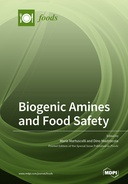Explore

Biogenic Amines and Food Safety
0 Ungluers have
Faved this Work
Login to Fave
Biogenic amines are bioactive compounds distributed in foods of all origins. Apart from their fundamental role in many bodily functions, there has recently been great interest in their toxicological potential, much research is being carried out to understand their occurrence related to both desired and undesired fermentative phenomena, chemical spoilage, low hygienic conditions, wrong handling, and criticism about technological factors of process and storage conditions. All these causes can contribute to a higher content of biogenic amines in food, particularly of those hazardous to human health. This book aims to collect scientific studies looking for new tools to limit the over-production of biogenic amines in food, search for new food sources of biogenic amines, and to spotlight the concept of safe food and bioactive amines content.
This book is included in DOAB.
Why read this book? Have your say.
You must be logged in to comment.
Rights Information
Are you the author or publisher of this work? If so, you can claim it as yours by registering as an Unglue.it rights holder.Downloads
This work has been downloaded 124 times via unglue.it ebook links.
- 124 - pdf (CC BY) at Unglue.it.
Keywords
- Aekjeot
- amines oxidase
- amino acids
- Antioxidants
- bioactive amines
- biogenic amine
- Biogenic Amines
- biogenic amines (BAs)
- brine-salting
- Cambodian fermented foods
- casing
- chemometrics
- Cheonggukjang
- Chinese rice wine
- cocoa nibs
- dried milkfish
- dry fermented sausage
- Enterococcus faecium
- Fermentation
- fermentation duration
- fermentation temperature
- Fermented foods
- food quality
- food safety
- geographical areas
- Histamine
- household smoker unit
- hygienic quality
- industrial fermentation
- Jeotgal
- kimchi
- L. plantarum
- Lipid Peroxidation
- liquid chromatographic triple quadrupole mass spectrometric (LC-MS/MS) analysis
- Low temperature
- maesil
- microbial characteristics
- microbiota
- multivariate (MV) statistical analysis
- Myeolchi-aekjeot
- Myeolchi-jeot
- n/a
- nigiri sushi
- occurrence
- polycyclic aromatic hydrocarbons
- Polyphenols
- proteolysis
- Public Health
- recommended limits
- Reduction
- Reference, information & interdisciplinary subjects
- Research & information: general
- roasting
- soaking
- starter cultures
- temperature
- Texture
- Tyramine
- tyrosine decarboxylase gene (tdc)
- volatile compounds
- volatile organic compounds
Links
DOI: 10.3390/books978-3-0365-0637-1Editions

